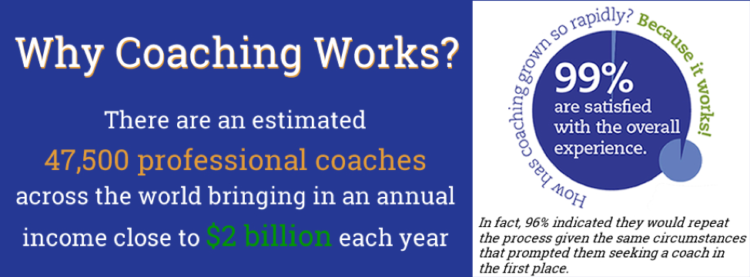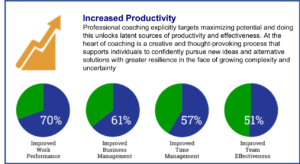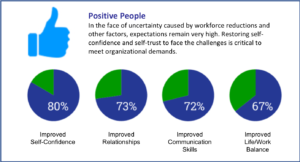What Do Starbucks and Coaching Have in Common?
What does a Starbucks venti one-pump caramel, one-pump white mocha, two scoops vanilla bean powder, extra ice Frappuccino with two shots (apagotto style), caramel drizzle under and on top of the whipped cream, double cupped … and a coaching session have in common? Although the coffee order might sound a little obnoxious to some, they are both examples of mass customization. Just as Starbucks was one of the companies that pioneered the individualization of your morning coffee, coaching is an individualization of one’s personal development.
 For nearly a hundred years, authors, motivational speakers, business owners, managers, and most recently Internet content, have been dishing out the seven steps to happiness, the five keys to make the sale, the four secrets to a better marriage, and libraries full of tips, tricks, advice and facts to help you live a better life. In fact, personal development is a billion-dollar industry! Of course, to narrow down any behavior, skill, field, value, or deep personal change, these authors must simplify, and often they oversimplify.
For nearly a hundred years, authors, motivational speakers, business owners, managers, and most recently Internet content, have been dishing out the seven steps to happiness, the five keys to make the sale, the four secrets to a better marriage, and libraries full of tips, tricks, advice and facts to help you live a better life. In fact, personal development is a billion-dollar industry! Of course, to narrow down any behavior, skill, field, value, or deep personal change, these authors must simplify, and often they oversimplify.
An Individualized Experience
Coaching delivers an individualized experience to those seeking personal development. Trained and skilled coaches facilitate a conversation where their clients explore deeply the areas of their lives where they seek to improve, change or redirect activities by setting goals, outcomes and new visions. Great coaches do this in a different way than just traditional goal setting. The goals are customized to the client through exploration of:
- Current and needed skills
- Necessary changes in decision making
- Moving beyond sticking points
- Thoughtful examination of intrinsic values
- The unfolding of the client’s self-image and identity
- How the goals fit into the greater unfolding of the client’s purpose, calling and vision.
Without this customization to the client, the personal ownership and motivation to achieve the goals will not be enough to engage the client into actions toward the goal.
Goal Alignment
 Once these aligned goals are set as committed intentions in the client’s life, the coach furthers the conversation by helping the client to lay out, develop and set actionable plans to achieve those goals. Since each and every client is on a personal journey starting from a different place and with individualized goals, these plans too must be customized. The coach may use a set of specific structures and experiential tools and processes to assist clients create their plans, because when the content comes from the clients, they are more likely to develop the motivation to make solid commitments to the plan.
Once these aligned goals are set as committed intentions in the client’s life, the coach furthers the conversation by helping the client to lay out, develop and set actionable plans to achieve those goals. Since each and every client is on a personal journey starting from a different place and with individualized goals, these plans too must be customized. The coach may use a set of specific structures and experiential tools and processes to assist clients create their plans, because when the content comes from the clients, they are more likely to develop the motivation to make solid commitments to the plan.
Sustainable Motivation
 The next phase of working with a coach is often the where the one-size-fits-all processes comes up short for the client as they begin to work on the plans. This is frequently the most difficult part. The most common request of clients from coaches is some version of “can you keep (or get) me motivated?” Of course, true sustainable motivation cannot be applied from external forces. In fact, coaches begin developing motivation within the client from the earliest moments in the coaching relationship. By ensuring that the goals are integrated, as mentioned previously, the client is already more likely to be able to sustain and maintain activity toward achieving the goals.
The next phase of working with a coach is often the where the one-size-fits-all processes comes up short for the client as they begin to work on the plans. This is frequently the most difficult part. The most common request of clients from coaches is some version of “can you keep (or get) me motivated?” Of course, true sustainable motivation cannot be applied from external forces. In fact, coaches begin developing motivation within the client from the earliest moments in the coaching relationship. By ensuring that the goals are integrated, as mentioned previously, the client is already more likely to be able to sustain and maintain activity toward achieving the goals.
Coaches develop the commitment and movement by engaging the client thorough contingency planning and regular adjustments of the activities being undertaken. This phase is supported through development of internal and external accountability systems. Highly skilled Coaches may begin by being the accountability partner, but over time they assist the clients in identifying and building systems that do not include the coach because at some point the client will leave the coaching relationship.
The Result
The final, concurrent conversations coaches facilitate are around ongoing satisfaction, completion, and deeper meaning. Of course, these conversations are started at the beginning and are carried through all the engagement between coach and client. A client who connects and feels a sense of meaning, accomplishment, and satisfaction, who celebrates completion of milestones, and finds purpose throughout the journey is a client who is much more likely to continue to move forward.

